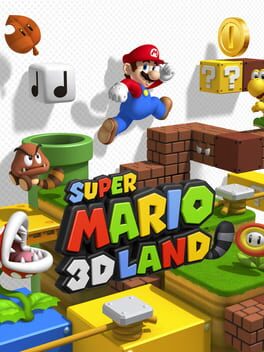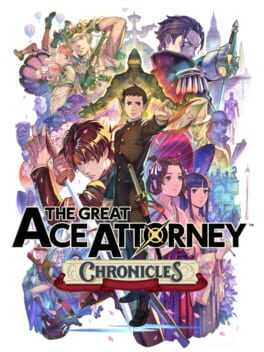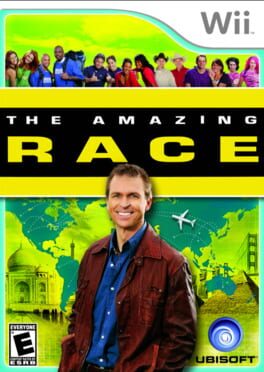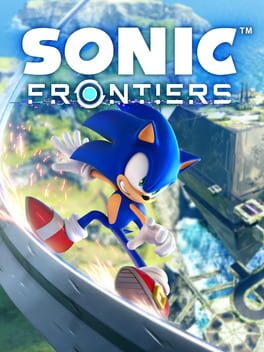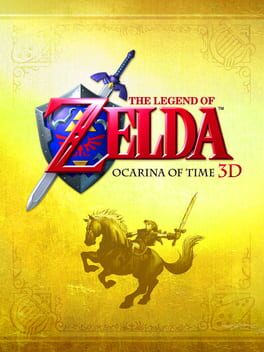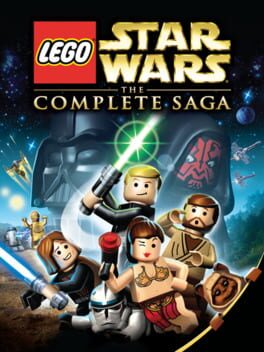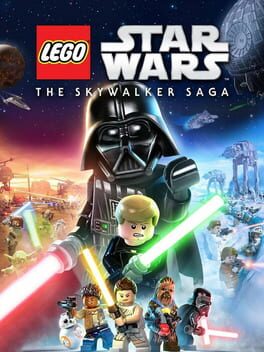Spiritofkoridai
2011
A recent replay of this game has seen some of this game's understated merits. I continue to hold the stance that in most ways this is a very traditional Mario game, and at least part of its acclaimed status in the 3DS library has more to do with being a first-party title than anything about how it innovates in its own right, however I think that this is a bit more substantially impressive than I was willing to give it credit for at one point, and I can definitely see why one might even recommend this game over 3D World. The short levels and easily obtained collectibles aren't an ideal Mario approach personally, but are more par for the course considering its handheld context when compared to its Wii U/Switch counterpart. The Bowser fights also have a cinematic edge to them that invokes the kind of dramatic tension the Galaxy games were able to achieve without being over-indulgent in referencing them outright, the final quarter of the game has some pretty tough levels (without the Tanuki suit), and the requirement for true 100% is also nowhere near as ornery as 3DW, which helps by some measure. Despite this, I finished the game feeling I had my fill of its format and it's not nearly as must-play as numerous other Mario titles on the whole, so it's cooler than I thought but not much more.
A much more substantial package after 2019’s trilogy release, it makes me so happy. Trilogy 2019 may have had the excuse of being Ace Attorney’s first step into the big leagues of the console and PC market, but this compilation right here showcases why the series should stay. Not only is this a remarkable localization of two of the series’ previously forbidden titles (ones that I myself thought would never see the light of day!), but the amount of extras that accompany it make this a worthwhile purchase even for someone who already played these games through fan-translated material like myself.
Even if I considered the games themselves to be little more than landfill material, I would still commend how inclusions like the bonus Randst Magazine episodes from the first game and the alternate costumes for the second are provided free of charge, and how the sheer amount of concept art & music on display signal how much care was put into what this product could offer players. This game even has in-game achievements for Switch players, which is a welcome addition along with being one I hadn’t considered.
Taking this on its strengths as a compilation separate from the games themselves, it is a great precedent for the rest of the series’ ports and future games to look to as an example of how substantive the content for these games can be. The score is only 4 stars as of now because of there being pre-order content. I don’t like that practice, I think the way it was executed was also pretty weird in this case, and I’ll only budge if that material is eventually able to be bought by others.
Even if I considered the games themselves to be little more than landfill material, I would still commend how inclusions like the bonus Randst Magazine episodes from the first game and the alternate costumes for the second are provided free of charge, and how the sheer amount of concept art & music on display signal how much care was put into what this product could offer players. This game even has in-game achievements for Switch players, which is a welcome addition along with being one I hadn’t considered.
Taking this on its strengths as a compilation separate from the games themselves, it is a great precedent for the rest of the series’ ports and future games to look to as an example of how substantive the content for these games can be. The score is only 4 stars as of now because of there being pre-order content. I don’t like that practice, I think the way it was executed was also pretty weird in this case, and I’ll only budge if that material is eventually able to be bought by others.
The best part of this game isn't the amount of freedom you have to explore, but rather that you have the freedom to not commit to anything in particular, drop whatever you're doing and get anything else done instead. If you're bored, fast-travel elsewhere and come back if you want. If you think your abilities will measure up in a fight with Ganon, then yeah go and do it. Do what you want, but more importantly do it when you want. I believe that's the most important element of the player experience of this game (and may be why I've not been thrilled about the Great Plateau experience at the very beginning in comparison to the rest).
It helps that there's almost always a notable hard and easy way of going about any given situation, whether it's a puzzle or an average combat encounter. The way you solve a problem pales in comparison to whether your methods get a good result, and your approach to a difficult challenge can be made as versatile as needed depending on what you're willing to lose. Playing the game once more for maybe the fourth time now has made me appreciate how, unlike so many other Zelda games before it, my actual skill at combat and recognition of the game world's nuances has tangibly improved so as to make Lynel encounters a cinch now when I wouldn't have touched them before, and difficult quests are made simpler with more deliberate consideration of what best ideas would work with the individualized amount of armor and food I have.
Some people claim it's not Zelda-like enough, but this is the new Zelda and that's probably okay.
It helps that there's almost always a notable hard and easy way of going about any given situation, whether it's a puzzle or an average combat encounter. The way you solve a problem pales in comparison to whether your methods get a good result, and your approach to a difficult challenge can be made as versatile as needed depending on what you're willing to lose. Playing the game once more for maybe the fourth time now has made me appreciate how, unlike so many other Zelda games before it, my actual skill at combat and recognition of the game world's nuances has tangibly improved so as to make Lynel encounters a cinch now when I wouldn't have touched them before, and difficult quests are made simpler with more deliberate consideration of what best ideas would work with the individualized amount of armor and food I have.
Some people claim it's not Zelda-like enough, but this is the new Zelda and that's probably okay.
2015
2010
Just like most media I've been obsessed with throughout, The Amazing Race sneaks up and inserts itself back into my life in a significant way.
After having dipped REALLY in and REALLY out of the show over the course of the 2010s, I completely incidentally caught wind of the premiere for Season 34 while channel surfing the night it aired, and since then my interest in the series as a whole has been reinvigorated. Most seasons are able to offer such a unique cohesive blend of struggles with cultural integration and confronting daring challenges, along with memorable cast dynamics and a compelling amount of drama and tenseness. Every aspect is needed in good measure to coalesce and craft an ideal TAR season that has the show's title match its content. Consider this review as much of an endorsement for the vast majority of the TV show as much it is about the Wii game. In the midst of my current series watch, it occurred to me that I own this game, and that it indeed exists.
Let's start with the bad news upfront: the game in question is Ubisoft-affiliated. And it gets worse: it has the exact same amount of polish and aesthetic similarities to most other mid-tier Wii licensed games. But I should stress that I mean mid-tier Wii titles, and the sheer amount of actual dogshit shovelware on the system should speak to the fact that there is ultimately worse out there, for what it's worth.
Fundamentally, there is some leeway that's deserved on behalf of the developers. The show is genuinely impossible to translate in a meaningful way into a video game from the start, short of being an MMO. From that standpoint, TARWii is still very much a barebones experience, with it being essentially a forced multiplayer mode that has a small minigame collection broken up by simulated travel segments where you choose how to spend the money you receive. Extremely basic, stripped down and not quite fun enough for a race's average length, but if this was hypothetically a game that could serve to later be expanded upon in a sequel or modern console reimagining, this is not an outright bad first step. Hey, ABC's Wipeout has more than 5 games to its name over the span of one console generation, so don't tell me there's no potential in making a good spin on TAR's formula if the team involved was allowed to be ambitious enough.
I've had more fun with this than anyone is history ever will.
Just kidding! I mean to say this game easily clears your favorite media, and you should cry yourself to sleep in knowing that you'll never be better than this shovelware. 10/10 #TARSWiiP
After having dipped REALLY in and REALLY out of the show over the course of the 2010s, I completely incidentally caught wind of the premiere for Season 34 while channel surfing the night it aired, and since then my interest in the series as a whole has been reinvigorated. Most seasons are able to offer such a unique cohesive blend of struggles with cultural integration and confronting daring challenges, along with memorable cast dynamics and a compelling amount of drama and tenseness. Every aspect is needed in good measure to coalesce and craft an ideal TAR season that has the show's title match its content. Consider this review as much of an endorsement for the vast majority of the TV show as much it is about the Wii game. In the midst of my current series watch, it occurred to me that I own this game, and that it indeed exists.
Let's start with the bad news upfront: the game in question is Ubisoft-affiliated. And it gets worse: it has the exact same amount of polish and aesthetic similarities to most other mid-tier Wii licensed games. But I should stress that I mean mid-tier Wii titles, and the sheer amount of actual dogshit shovelware on the system should speak to the fact that there is ultimately worse out there, for what it's worth.
Fundamentally, there is some leeway that's deserved on behalf of the developers. The show is genuinely impossible to translate in a meaningful way into a video game from the start, short of being an MMO. From that standpoint, TARWii is still very much a barebones experience, with it being essentially a forced multiplayer mode that has a small minigame collection broken up by simulated travel segments where you choose how to spend the money you receive. Extremely basic, stripped down and not quite fun enough for a race's average length, but if this was hypothetically a game that could serve to later be expanded upon in a sequel or modern console reimagining, this is not an outright bad first step. Hey, ABC's Wipeout has more than 5 games to its name over the span of one console generation, so don't tell me there's no potential in making a good spin on TAR's formula if the team involved was allowed to be ambitious enough.
I've had more fun with this than anyone is history ever will.
Just kidding! I mean to say this game easily clears your favorite media, and you should cry yourself to sleep in knowing that you'll never be better than this shovelware. 10/10 #TARSWiiP
2022
This review contains spoilers
This is such a tragic turn of events. After having been legitimately invested for the first two islands and much of the third, and mind you, still having a degree of appreciation for the overall gameplay loop introduced here, most of the second half of the game falls so short of expectations that the game as a whole is unable to truly prove itself as a reliably sustainable format for the series to rely on. Sonic Team clearly don't have the amount of resources needed to push and shove Sonic all the way into the echelons of the AAA gaming space without a decade of dev time at least. It becomes a game that's okay if I'm feeling generous, and is definitely not representative of a evolutionary leap forward when considered as a whole.
From a gameplay standpoint, there are substantial aspects that I do like: Sonic has one of my favorite control schemes of his in the open zones and I can see the purpose as to why disjointed platforms are the main means of conveying basic platforming challenges in the open zones. Big's fishing is a good ol' chill time, and the first two islands especially have just enough going on between the different types of content that one doesn't overstay its welcome for too long; despite some jank (negative connotation) with fighting some of the Guardians and practical annoyances with traversal, it's generally enough to keep engagement alive. Despite this, not only is it obvious how half-baked the 4th and 5th islands are, but so much of the open nature of the game becomes more and more reeled in as the game continues, mostly leading towards awkwardly fighting against the open zones' 2D sections and the realization that almost none of the platforming sequences in the game actually encouraged maximizing your own sense of speed in any way. I almost wish the open areas leaned more into Spyro (mostly 1's) level design in the sense that using speed combined with the air boost to intentionally direct players to burst onto unexpected, yet organic environments for rewards would probably be more satisfying when offset by slower platforming build-ups. In comparison, the whole floating rail concept has poor signposting with every one being identical in design and function regardless of whether it serves as fast travel or an already completed sequence, and designing these shorter linear obstacle courses has got to be more taxing for the developers to implement than simply using the natural contours of the environment effectively as the dominant means of traversal. I kind of like Cyberspace as presented (his handling is refreshingly doable instead of haphazard and inconsistent-feeling), but agree with the majority online that there's no reason for every move you make to feel like Sonic's hampering his own speed, and in general his boost should be made faster. In one instance, one of the falling Sky Sanctuary spirals was made impossible to race up without air boosting past two initial platforms instead of jumping on them as was seemingly intended. The red ring requirements should have required multiple runs of the levels at least, and the amount of control reliability at the start of the game was hard to reckon with at first, but that eventually settles and all the cyberspace levels start to feel about the same, which is basically fine and enjoyable enough.
However, I need to get this off my chest: the writing is probably consistently the worst part of this game, and the part that I kept returning to both during and after my playthrough as a specific sticking point that reveals how little foresight was made in handling this game's characters and premise potential. A major reason for this is the self-defeating decision to treat the series up to this point, including 2010's era Sonic, as though it's a linear timeline while still attempting to inject the side characters with completely different attributes. I think it's nice on a surface level, e.g., that Tails and Amy are not only defined by being nerdy and swoony respectively anymore, but this doesn't mean that their contributions this time around feel any more natural or substantial than when they were standing in a Sonic Generations-brand void. In fact, of the three of Sonic's friends, Knuckles is handled by far the best, with not only his own take on on the Starfall Islands and connections to Angel Island that naturally only he would know, but also some emotional moments interacting with Sonic that genuinely land. Tails and Amy, however, both feel like their existence revolves around being stand-ins for Internet fandom criticism of themselves without any actual purpose or resolution to their insecurities beyond that base level recognition. It can be viewed as a step in the right direction, but an apology for past bad writing doesn't constitute good writing on its own, and very little is actually achieved through either of their portrayals aside from retreading old ground (Tails) or practically sowing over that old ground without anything compelling character-wise to replace it (Amy why, they did you so dirty what the hell).
Not to mention the amount of fanbase lip service as a whole borders on tedious. There are more subtle and organic ways to invoke past entries without throwing me out of the game I'm currently playing to remind me of another with very little prompting; the namedrops can be genuinely grating at times. The new ideas that do have potential to be explored, like the extent of Sage and Eggman's relationship, is practically relegated to side content in comparison to the number of times Tails has to remind me that the volcanic crater on Chaos Island looks like the Biolizard's butthole. It's astounding that the new ideas presented in this game are given so little room to breathe in comparison while the reliance on old titles is just as prevalent and ultimately meaningless as is familiar for this series of late. Eggman's memos do fare better in this regard though: this sort of optional reward for playing a certain side mode that is just Eggman musing to himself feels much more appropriate for a Sonic history lesson. There are only so many scenes in this game, optional or mandatory, that feel natural to engage with as opposed to serving as hollow reassurance for the playerbase it's trying to win back that the characters can exist as non-caricatures again, and that's just nowhere near enough to paper over a story that has too little going on otherwise. I didn't even mention a single thing about the Ancients here because I have no reason to be invested in their story aside from Knuckles' brief Angel Island deduction; it's lore additions without a gut punch, very little reason to care.
Final general notes: This game is a blueprint of itself in both writing and game design, and while it is valid to view it as a step in a more ideal direction for Sonic and in some regards I agree, its most pressing criticism has spoken more to me and it speaks volumes that after all this dev time, the effort isn't all the way there yet in creating something truly compelling and complete feeling. I cannot speak to what exactly this series "needs" at any given time or what is best in order to excel for both Sonic's die-hard fans and people who just want a solid game with no strings attached, but I don't think what it needed amounts to an apology notice for the last 10 years and a messy, rushed latter half. Even considering the gameplay aspects I'd like to see more of, there's so much more this title could have potentially offered on a fundamental level.
Baby steps, I suppose.
From a gameplay standpoint, there are substantial aspects that I do like: Sonic has one of my favorite control schemes of his in the open zones and I can see the purpose as to why disjointed platforms are the main means of conveying basic platforming challenges in the open zones. Big's fishing is a good ol' chill time, and the first two islands especially have just enough going on between the different types of content that one doesn't overstay its welcome for too long; despite some jank (negative connotation) with fighting some of the Guardians and practical annoyances with traversal, it's generally enough to keep engagement alive. Despite this, not only is it obvious how half-baked the 4th and 5th islands are, but so much of the open nature of the game becomes more and more reeled in as the game continues, mostly leading towards awkwardly fighting against the open zones' 2D sections and the realization that almost none of the platforming sequences in the game actually encouraged maximizing your own sense of speed in any way. I almost wish the open areas leaned more into Spyro (mostly 1's) level design in the sense that using speed combined with the air boost to intentionally direct players to burst onto unexpected, yet organic environments for rewards would probably be more satisfying when offset by slower platforming build-ups. In comparison, the whole floating rail concept has poor signposting with every one being identical in design and function regardless of whether it serves as fast travel or an already completed sequence, and designing these shorter linear obstacle courses has got to be more taxing for the developers to implement than simply using the natural contours of the environment effectively as the dominant means of traversal. I kind of like Cyberspace as presented (his handling is refreshingly doable instead of haphazard and inconsistent-feeling), but agree with the majority online that there's no reason for every move you make to feel like Sonic's hampering his own speed, and in general his boost should be made faster. In one instance, one of the falling Sky Sanctuary spirals was made impossible to race up without air boosting past two initial platforms instead of jumping on them as was seemingly intended. The red ring requirements should have required multiple runs of the levels at least, and the amount of control reliability at the start of the game was hard to reckon with at first, but that eventually settles and all the cyberspace levels start to feel about the same, which is basically fine and enjoyable enough.
However, I need to get this off my chest: the writing is probably consistently the worst part of this game, and the part that I kept returning to both during and after my playthrough as a specific sticking point that reveals how little foresight was made in handling this game's characters and premise potential. A major reason for this is the self-defeating decision to treat the series up to this point, including 2010's era Sonic, as though it's a linear timeline while still attempting to inject the side characters with completely different attributes. I think it's nice on a surface level, e.g., that Tails and Amy are not only defined by being nerdy and swoony respectively anymore, but this doesn't mean that their contributions this time around feel any more natural or substantial than when they were standing in a Sonic Generations-brand void. In fact, of the three of Sonic's friends, Knuckles is handled by far the best, with not only his own take on on the Starfall Islands and connections to Angel Island that naturally only he would know, but also some emotional moments interacting with Sonic that genuinely land. Tails and Amy, however, both feel like their existence revolves around being stand-ins for Internet fandom criticism of themselves without any actual purpose or resolution to their insecurities beyond that base level recognition. It can be viewed as a step in the right direction, but an apology for past bad writing doesn't constitute good writing on its own, and very little is actually achieved through either of their portrayals aside from retreading old ground (Tails) or practically sowing over that old ground without anything compelling character-wise to replace it (Amy why, they did you so dirty what the hell).
Not to mention the amount of fanbase lip service as a whole borders on tedious. There are more subtle and organic ways to invoke past entries without throwing me out of the game I'm currently playing to remind me of another with very little prompting; the namedrops can be genuinely grating at times. The new ideas that do have potential to be explored, like the extent of Sage and Eggman's relationship, is practically relegated to side content in comparison to the number of times Tails has to remind me that the volcanic crater on Chaos Island looks like the Biolizard's butthole. It's astounding that the new ideas presented in this game are given so little room to breathe in comparison while the reliance on old titles is just as prevalent and ultimately meaningless as is familiar for this series of late. Eggman's memos do fare better in this regard though: this sort of optional reward for playing a certain side mode that is just Eggman musing to himself feels much more appropriate for a Sonic history lesson. There are only so many scenes in this game, optional or mandatory, that feel natural to engage with as opposed to serving as hollow reassurance for the playerbase it's trying to win back that the characters can exist as non-caricatures again, and that's just nowhere near enough to paper over a story that has too little going on otherwise. I didn't even mention a single thing about the Ancients here because I have no reason to be invested in their story aside from Knuckles' brief Angel Island deduction; it's lore additions without a gut punch, very little reason to care.
Final general notes: This game is a blueprint of itself in both writing and game design, and while it is valid to view it as a step in a more ideal direction for Sonic and in some regards I agree, its most pressing criticism has spoken more to me and it speaks volumes that after all this dev time, the effort isn't all the way there yet in creating something truly compelling and complete feeling. I cannot speak to what exactly this series "needs" at any given time or what is best in order to excel for both Sonic's die-hard fans and people who just want a solid game with no strings attached, but I don't think what it needed amounts to an apology notice for the last 10 years and a messy, rushed latter half. Even considering the gameplay aspects I'd like to see more of, there's so much more this title could have potentially offered on a fundamental level.
Baby steps, I suppose.
This review contains spoilers
The game is generally up to Zelda standards of quality, but would gain an entire star if fast travel to Kakariko in particular was introduced way earlier than it is (post-Water Temple, for clarity). The narrative benefits of having child Link be expressly outmatched by his much larger surroundings and having him trek his way through the entire world loses its luster quickly in comparison to the tedium that is felt by having to run through the barren Hyrule Field again in search for side quest progression.
Played this game a few months back to look back on fond childhood experiences and it didn't resonate this time. Most actions just become repetitive very quickly, a good portion the levels are themed after unmemorable parts from the movies and aren't any more exciting to play, and that's before event touching the topic of vehicle missions entirely. Just felt very tedious to play all around, with the cutscenes far and away some of the most memorable content.
I think plenty of kids would still really like this if they were playing for the first time today, and this game still remains a formative part in my interest of gaming, but it just didn't hit the same high notes. It wasn't a miserable experience, but I get tired now.
I think plenty of kids would still really like this if they were playing for the first time today, and this game still remains a formative part in my interest of gaming, but it just didn't hit the same high notes. It wasn't a miserable experience, but I get tired now.
Haven't touched since the month of release, but this was a fun game when it decided to not crash. Seriously, this title is an improvement from the original games with more engaging combat, varied objectives, expansive areas to explore and less challenges in levels that solely boil down to being the correct character. So as fun as modern LEGO games regularly go, whatever your threshold for acceptance of that is.
The biggest problems are with certain spaceship encounters where the camera freaks the fuck out and it's impossible to get your bearings, and the game itself having trouble staying awake.
No, seriously, it crashed no less than 10 times during my 1 playthrough, what da heck 😯
The biggest problems are with certain spaceship encounters where the camera freaks the fuck out and it's impossible to get your bearings, and the game itself having trouble staying awake.
No, seriously, it crashed no less than 10 times during my 1 playthrough, what da heck 😯
